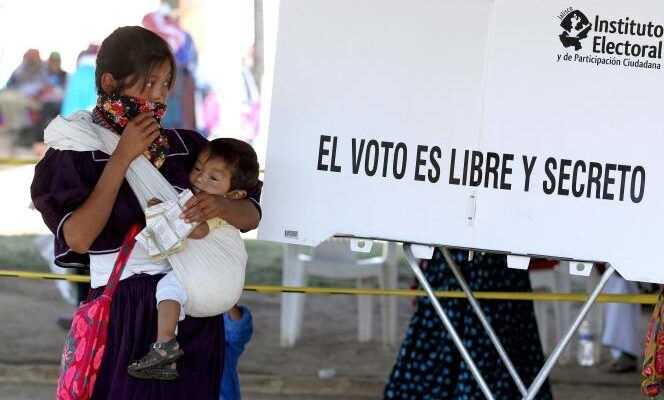Mexicans elected their deputies and local officials on Sunday, June 6 in legislative and local elections in the form of a mid-term test for President Andres Manuel Lopez Obrador (“AMLO”), enamelled by violence and marked by the pandemic of Covid-19.
This violence, in particular the assassination confirmed on Sunday of five electoral officials who fell the day before in an ambush in the state of Chiapas (south) after having organized a polling station, did not however compromise the good conduct of the current election. according to the authorities.
Polling stations will close at 6 p.m. (1 a.m. Monday Paris time) for a ballot in which 95 million Mexicans are invited, who vote for a new Chamber of Deputies, some 20,000 regional posts and 15 of the 32 governor’s posts . Initial estimates “Out of the ballot box” should be announced after the close of polling stations.
20 polling stations could not be installed
Some 91 politicians have been assassinated since September, when the campaign began. Of these, 36 were candidates or in the process of being appointed.
Public Security Secretary Rosa Icelanda Rodriguez said areas of violence were identified during election day. “Fortunately the National Guard is already deployed in these places”, she told reporters after voting.
In Guerrero (south), one of the most violent states in the country, members of the community civilian police were patrolling.
“Members of organized crime come to divide people, they don’t let them vote freely”, warned Isaías Posotema, one of the police officers in Chilapa, an area plagued by gangs.
The National Electoral Institute (INE) indicated that due to disturbances of public order, 20 polling stations out of a total of 162,000 could not be set up.
“Long live democracy! “exclaimed Andres Manuel Lopez Obrador, 67, after depositing his ballot in the ballot box a few steps from the presidential palace in central Mexico City. For the leftist president, elected for six years in 2018, this is a crucial test as he hopes to retain control of the House.
A “referendum” for or against AMLO
“The stake is neither more nor less than the future of Mexico”, says Pamela Star, professor at the University of Southern California noting that “Voters will have to choose between two visions of the future for Mexico: that of AMLO reforms or a return to an older policy”. “This election is a referendum for Lopez Obrador”, estimates the British consulting firm Capital Economics. This day is “The most important and the most complex of the last thirty years”, said the president of the National Electoral Institute, Lorenzo Cordova.
Although Mexico is one of the countries hardest hit by the Covid-19, the prospect of a sanction vote seems to be receding with the retreat of the indicators of the health crisis, according to several polls. In fact, AMLO maintains a popularity rating of over 60% and should maintain a comfortable majority.
Mexico, a country of 126 million inhabitants, has recorded nearly 229,000 consecutive deaths from Covid-19. The death rate is the fourth in the world in absolute numbers and the 19e per 100,000 inhabitants.
The ruling alliance, led by AMLO’s Morena party, has a qualified majority in the Chamber of Deputies (two-thirds of the 500 deputies), which is elected every three years. According to polls by the Oraculus Institute, the ruling party could narrowly lose this domination, dropping from 333 to 322 seats. Morena also controls the Senate – which is not the stake of this election – and must negotiate with the other blocks to obtain a qualified majority. Strongly weakened under the domination of the AMLO administration, the opposition competes with an alliance of traditional parties: the historic PRI (center), the PAN (conservative) and the PRD (left).
The Mexican economy, the second largest in Latin America, contracted 8.5% in 2020 amid tight spending controls by the government, which, along with the autonomous central bank, is forecasting a 6-7 rebound. % this year.
